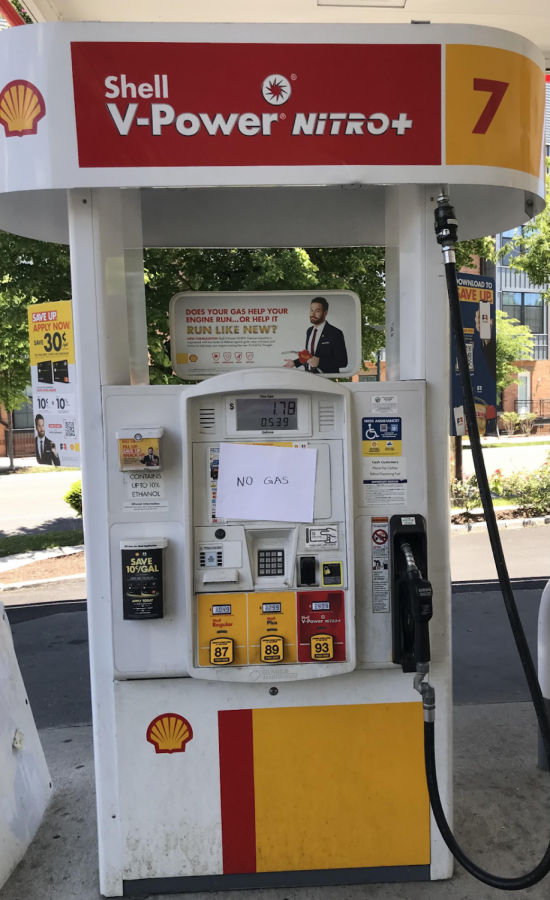Your donation will support the student journalists of The Tide, Richard Montgomery High School's student newspaper. Your contribution will allow us to purchase equipment and cover our annual website hosting costs.
Southeast faces oil shortage
May 15, 2021
Across the Southeast, desperate motorists are emptying the gas pumps at more than 10,000 gas stations in response to a ransomware attack on Colonial Pipeline, the United States’ largest purveyor of refined fuel, last Friday.
Ransomware disarrays data that can only be decrypted with a software key after the victim pays off the ransom issued by the criminal perpetrators. They occur so often that the Biden administration’s 100 day plan includes the need for protection of the nation’s critical infrastructure against cybersecurity threats.
The FBI disclosed on Monday that a hacking group known as Darkside, believed to be based in Russia and active since August 2020, was behind the recent ransomware attack on the oil pipeline. Darkside is one of many ransomware gangs that commits double extortion, meaning that its members steal an organization’s data, encrypt it and then threaten to dump that data online if the victim does not pay up.
The group maintains a website called “DarkSide Leaks” that is modeled on WikiLeaks, where the hackers post the private data of companies that they have stolen. The group has already published confidential data on more than 40 victims.
According to Boston-based Cybereason, DarkSide does not have political affiliations. Rather, their goal is to make money and appear ‘ethical’ in doing so by having a code of conduct for their customers that forbids organizations such as nonprofits and schools from being exploited. A portion of money stolen from for-profit corporations is donated to charities and as a result, DarkSide dons a Robin-Hood-like persona.
Neither Colonial nor federal officials have explained how the attackers breached the company’s network and went undetected, though experts believe Colonial may not have employed sophisticated networks designed to identify anomalies in the system.
Colonial carries more than 100 million gallons of fuel per day from Texas to New Jersey, where it is dispensed to 14 states along the Southeast.
In response to its compromised system, the company paid nearly $5 million to the hackers hours after the incident and received a decrypting tool to restore its disabled computer network in return. Unfortunately, the tool was so slow that Colonial continued restoring its system from backups to resurrect the pipe up to Wednesday, when it finally restarted.
Unfortunately, gasoline in the pipeline travels at just five miles per hour. As a result, drivers in Maryland are being turned away from empty gas pumps or must wait in a long line of people eager to acquire the limited amount of gasoline available at gas stations.
Although it will take a few days to get the pipeline back to normal, certain people are exacerbating the shortage by filling up numerous containers and bags with excess fuel in addition to their tank. Akin to the hoarding of toilet paper last Spring, people are panicking and are taking away fuel from others who need it to get to school, the hospital, etc. Experts stress there is no underlying supply shortage to panic about, but hoarding gasoline creates one.
On the upside of this situation, Richard Montgomery students are rethinking their blatant dependence on driving as a primary mode of transportation.
“I have my license and I never realized how often I choose to drive until now when I have to preserve my gas and have to walk instead,” junior Kathleen Cole said. “I really hope it all gets resolved soon because it has started a bit of chaos for everyone!”
Likewise, the shortage made senior Julianna Olano think about how often she takes driving for granted.
“It’s so easy for us to get gas that we never really think about where it comes from or how other countries get their oil,” Olano said. “ I’ve been thinking about how many people need the oil for their jobs and getting to places since I don’t have gas myself right now.”
Virginia has 50 percent of stations without fuel. For D.C. it is 73 percent and for Maryland, 39 percent. Prices of gas have risen 8 cents per gallon due to the current demand and are expected to increase an additional 7 cents before Memorial Day weekend. Governor Larry Hogan has issued a warning against price gouging (inflating the price of gas significantly) that takes advantage of customers by station owners.
Tanker trucks are being disseminated to affected areas to refuel dry stations after they load up in New Jersey. The number of tanker trucks on the road will be about 20 percent of the pre-shutdown normal at 100 percent.
